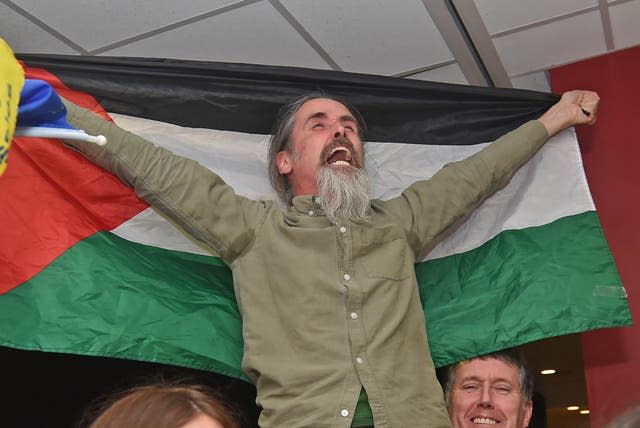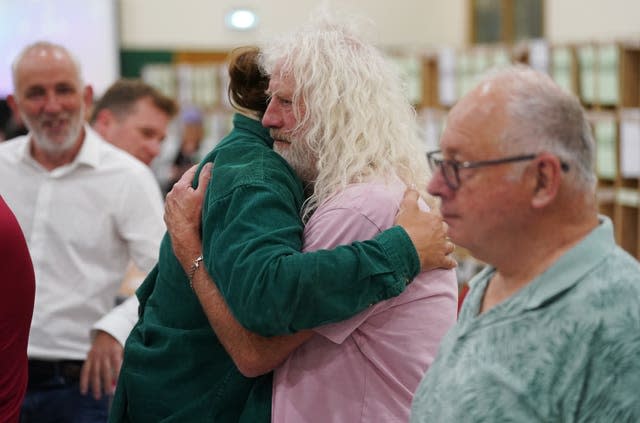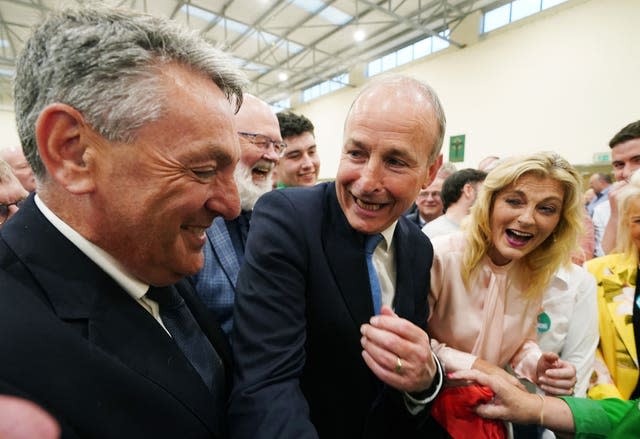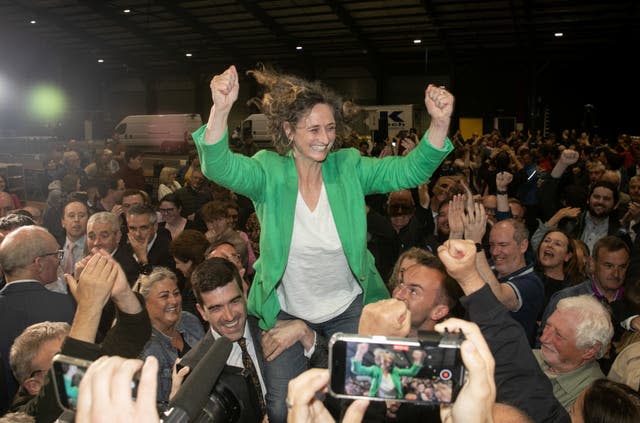Cowen elected as marathon count enters final stages
There are only three MEPs yet to be officially announced in Ireland, following the election of Fianna Fail’s Barry Cowen.
Mr Cowen was elected at 1.30am on Friday morning following days of counting for the Midlands-North-West constituency at the TF Royal Theatre in Castlebar, Co Mayo.
Ireland has elected 11 of 14 MEPs, as counting continued into the early hours of Friday in search of final results in what is the last remaining region to declare.
Fianna Fail has doubled its presence in the European parliament, with Fine Gael on track to pick up two more seats for a total of four – down one from its previous showing in 2019.
In Midlands-North-West, left-wing independent Luke “Ming” Flanagan was re-elected on the 19th count while Mr Cowen got over the line on the subsequent round.

Speaking to reporters, Mr Cowen said: “I’m very humbled, proud – delighted, obviously. I’m thrilled to have set out to win a seat and delighted to have done so.”
He added: “It now matters that we don the green jersey and ensure we live up to the expectations and commitments that have been given to the public.”
Party leader Micheal Martin was in the count centre to see his candidate get elected.
He defended the much criticised strategy of running three party candidates in the election: “One can speculate on these issues.
“But when I look at the figures here, I’m not sure that’s the conclusion that one could come to and – hindsight is a great virtue, but we will evaluate this like every other result.”

Four candidates are fighting for the remaining three seats, with Fine Gael’s Maria Walsh and Nina Carberry almost certain to be elected.
That leaves Independent Ireland candidate and former RTE correspondent Ciaran Mullooly fighting over the last seat with Sinn Fein’s Michelle Gildernew, who trails in her effort to retain the party’s place in the constituency.
Counting continued past 3.00am on Friday, with the redistribution of Mr Flanagan’s surplus.
After that count, should Mr Mullooly’s lead hold by more than the surplus obtained by Mr Cowen – he will be deemed elected.
Unpredictable transfers, which political commentators said were not following traditional patterns, are adding to the drama of who will claim the final seats.

Ireland South elected Fine Gael’s Sean Kelly, independent Michael McNamara, Sinn Fein’s Kathleen Funchion as well as Fianna Fail’s Billy Kelleher and Cynthia Ni Mhurchu.
Dublin’s electorate selected Fianna Fail’s Barry Andrews, Sinn Fein’s Lynn Boylan, Fine Gael’s Regina Doherty and Labour’s Aodhan O Riordain.
Five MEPs have lost their seats throughout the entire process: Sinn Fein’s Chris MacManus, Greens Grace O’Sullivan and Ciaran Cuffe as well as independents Mick Wallace and Clare Daly.
Taoiseach and Fine Gael leader Simon Harris travelled to Castlebar to congratulate Ms Carberry and Ms Walsh on their expected confirmation as MEPs.

Mr Harris said he and other Government leaders had not had a discussion on the holding of by-elections and added: “I certainly don’t fear by-elections.”
Asked about the fact that Fine Gael will be down by one seat by the end of the election, he said the party will review its strategy.
Irish voters headed to the polls last Friday to pick 949 local councillors, 14 MEPs and the country’s first directly elected mayor.
Results emerging from the three elections have been seen as a political boon for coalition partners Fine Gael and Fianna Fail, while the largest opposition party, Sinn Fein, has initiated a review after performing well below its own expectations.
Fianna Fail has emerged as the largest party in local government after all seats in Ireland’s local election were filled.
In the local elections, both main Government parties attracted around 23% of first preference votes, representing a slight drop on their 2019 result.
Sinn Fein has increased it share of councillors, but party leader Mary Lou McDonald has admitted the result fell below their expectations.

The popular vote of 12% is a dramatic turnaround in fortunes for the main opposition party which emerged from the 2020 general election on 24.5%.
Meanwhile, the Labour party is down one to 56 councillors, the Green Party’s support fell to 26 council seats while the Social Democrats’ share rose to 35.
The number of Independent councillors has also increased.
Fianna Fail will be tied with Fine Gael in terms of political representation at the European Parliament, despite the latter ending the elections with one fewer seat.
Sinn Fein has also increased its share of MEPs, and is hopeful for an additional seat through Ms Gildernew.
The results have fuelled speculation that the Government may look to call a general election earlier than the current projected timeline of spring 2025.
However, the leaders of all three coalition parties, Mr Harris, Mr Martin and Green Party leader Eamon Ryan, have all insisted they remain committed to the government going full term.
For her part, Sinn Fein leader Ms McDonald, who is facing questions over her stewardship of the party, has struck a defiant tone, urging Mr Harris to “bring it on” and call an early election.
With the election of TDs to the European Parliament, there will be a need for several by-elections in the coming six months.
That has added to speculation that the Government may seek an earlier general election, rather than fighting several potential by-elections only months before the Dail is dissolved.
Elsewhere, in a landmark poll in Limerick for Ireland’s first directly elected mayor, independent candidate John Moran secured victory late on Tuesday afternoon.

 Yahoo News
Yahoo News 
